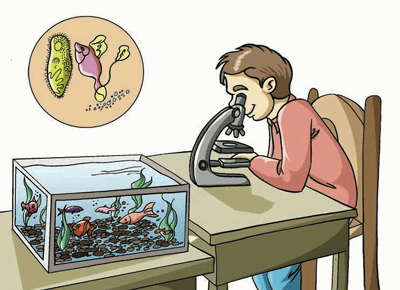-cule, -cula, -culo, -culus, -culum
(Latin: a suffix; small, tiny; also, result of the act of, means of)
A creature that is so small as to be visible only with the aid of a microscope: Certain animalcules, which cannot be seen normally, can be breathed in through the nose and mouth into the body and can cause illnesses.


auriculare (s), auricularia (pl)
A craniometric point at the center of the opening of an external auditory canal.
auriculocranial
1. Relating to the auricle or pinna (primary segment) of the ear and the cranium.
2. A reference to an ear and the cranium.
2. A reference to an ear and the cranium.
The ratio of the breadth of the skull between the auricular points of the ear to its greatest breadth: Jack had to find out the auriculoparietal of the skull by measuring the width between the auricular points to its greatest width.
auriculotemporal
Referring to an ear and the temporal region, or the surface region of the head on either side roughly corresponding to the outline of the temporal bone (one of the two irregular bones forming part of the lateral surfaces and base of the skull, and containing the organs of hearing).
molecule
ossiculum (s), ossicula (pl)
particular
1. Relating to one person or thing out of several.
2. Something which is special and worth mentioning.
3. Belonging to one person and being different from those of other people.
4. Having or demanding high standards or taking great care when making a choice.
5. A term for emphasizing that someone is talking about one specific person or thing and not anyone or anything else.
6. Belonging to, or associated with a specific person, group, thing, or category; not with anything in general or universal.
7. Etymology: "referring to a single thing or person" is from Old French particuler; from Late Latin particularis, "of a part"; which came from Latin particula, "particle".
2. Something which is special and worth mentioning.
3. Belonging to one person and being different from those of other people.
4. Having or demanding high standards or taking great care when making a choice.
5. A term for emphasizing that someone is talking about one specific person or thing and not anyone or anything else.
6. Belonging to, or associated with a specific person, group, thing, or category; not with anything in general or universal.
7. Etymology: "referring to a single thing or person" is from Old French particuler; from Late Latin particularis, "of a part"; which came from Latin particula, "particle".
<img src="/img/left_arrow_sm.gif" alt="" /> <img src="/img/right_arrow_sm.gif" alt="" />
Showing 1 page of 8 main-word entries or main-word-entry groups.
